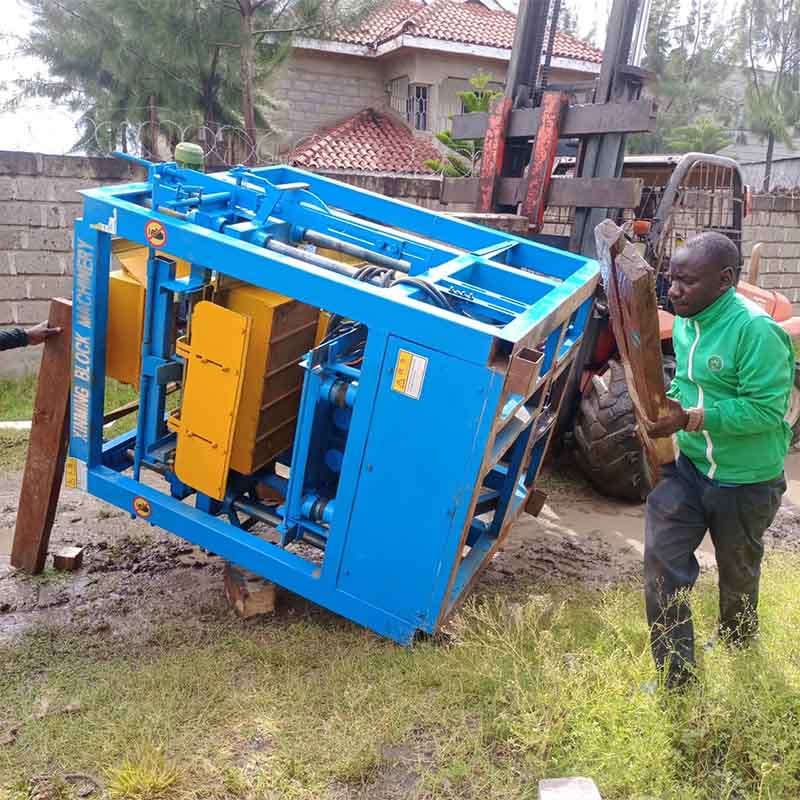
In the dynamic world of construction, the pursuit of innovation and efficiency has fueled a relentless drive to reimagine traditional processes.
At the forefront of this transformation stands the fully automatic block machine—a technological marvel that holds the key to unlocking unprecedented productivity.
This essay explores the profound impact of fully automatic block machines on the construction industry, delving into their cutting-edge features, implications for productivity, potential challenges, and the promising future they herald.
A Glimpse into the Evolution of Construction Technology
Construction practices have evolved significantly from the manual labor-intensive methods of the past.
The fully automatic block machine represents a pivotal moment in this evolution, seamlessly blending advanced engineering with automation to revolutionize the block production process.
From raw material handling and mixing to molding, curing, and stacking, every stage is orchestrated by precision automation, minimizing human intervention and maximizing efficiency.
Unveiling the Cutting-Edge Features of Fully Automatic Block Machines
Seamless Automation: The hallmark of fully automatic block machines is their seamless and comprehensive automation.
Through intricate robotics and sophisticated controls, these machines orchestrate every facet of block production with minimal human interference, ensuring a continuous and efficient workflow.
Unprecedented Productivity: Fully automatic block machines operate at remarkable speeds, producing a high volume of blocks in a fraction of the time required by manual methods.
This exponential boost in productivity has the potential to transform construction timelines and project scalability.
Precision and Consistency: Automation ensures unparalleled precision and uniformity in block size, shape, and strength.
This heightened level of consistency bolsters the structural integrity of buildings and minimizes potential construction defects.
Resource Optimization and Sustainability: Fully automatic block machines optimize the use of raw materials, minimizing waste and contributing to a more sustainable construction process.
Moreover, these machines can incorporate recycled materials, aligning with eco-conscious building practices.
Real-time Monitoring and Data Insights: Advanced sensors and monitoring systems provide real-time data on production metrics.
Operators can make informed decisions and fine-tune processes based on this data, further enhancing efficiency and quality control.
Revolutionizing Productivity and Construction Practices
Accelerated Project Timelines: The unparalleled speed of fully automatic block machines translates into significantly shorter project timelines.
Construction companies can complete projects faster, meet tight deadlines, and capitalize on market opportunities.
Labor Transformation: Automation reduces the reliance on manual labor for repetitive tasks, creating opportunities for skilled technicians to oversee and maintain the machines.
This shift in workforce dynamics promotes specialization and expertise.
Elevated Quality Assurance: The precision and consistency of fully automatic block machines directly impact the quality of blocks produced.
Enhanced quality assurance leads to safer, more durable buildings and fosters client confidence.
Architectural Innovation: With the capabilities of fully automatic block machines, architects and designers can explore intricate and imaginative block designs that were previously challenging to execute.
This opens up a realm of creative possibilities in construction.
Addressing Challenges and Embracing the Path Forward
The adoption of fully automatic block machines may entail a substantial initial investment.
However, the potential long-term gains in productivity, quality, and reputation can outweigh the upfront costs.
Operating and maintaining these advanced machines require specialized technical skills.
Companies must invest in training to ensure their workforce is equipped to manage and troubleshoot the technology effectively.
The integration of automation may necessitate a shift in workforce roles. Clear communication, training, and support are vital to ensure a smooth transition and maintain a motivated workforce.
Manufacturers, industry associations, and construction professionals must collaborate to promote awareness and education about the benefits and potential of fully automatic block machines.
Envisioning the Future of Construction Automation
The future holds the potential for even smarter fully automatic block machines that adapt and optimize production processes based on real-time data, enhancing efficiency and adaptability.
Future machines might offer modular designs that enable customization and quick adaptation to varying block specifications, providing construction companies with enhanced flexibility.
As automation technology spreads, regions with burgeoning infrastructure needs could benefit immensely from the efficiency and sustainability offered by fully automatic block machines.
The seamless integration of various automated construction technologies, such as robotic assembly and 3D printing, could lead to fully automated construction sites, transforming the way we build.
In conclusion, the fully automatic block machine embodies the future of construction—a future marked by unparalleled productivity, precision, and sustainability.
While challenges exist, the potential rewards are substantial, ranging from accelerated project completion to innovative architectural design.
As the construction industry embraces automation, it propels itself toward a future where human ingenuity and cutting-edge technology collaborate to build a more efficient, sustainable, and visionary built environment.
